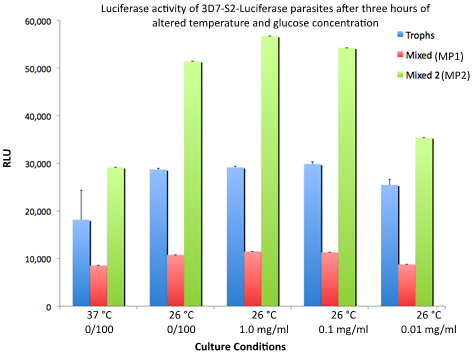Reference no: EM13884200
Presentation and interpretation of data.
For this assignment you will be marked on your presentation and interpretation of the data given to you. At all levels of communication, the easiest way to present your ideas or results is to do so clearly, neatly, and in a uniform manner. Your aim is to guide the reader into accepting your interpretation of the data.
To make a graph, keep the following basic steps in mind.
• Assign which variable to plot on the x-axis (typically independent) and y-axis (typically dependant).
• Assign a minimum and maximum on each axis to incorporate your minimum and maximum values.
• Plot the data and make it as visually simple as possible.
• Give the graph a title.
Below is an example of a completed figure.

Figure 1: Luciferase assay to measure induction (Relative Light Units, RLU) of the Plasmodium falciparum S2-rRNA-promoter in different environmental conditions.
Main assignment: Short scientific report
In this section you will be presenting the data in table 1 and calculating a t-test to see if there is a significant difference between samples. You will need to make a figure and a table, and discuss the results. You will be presenting this section as a small report. Include a short hypothesis within the introduction, a results section, and a short discussion using the questions below.
A glasshouse experiment was performed to investigate the effect of different levels of carbon dioxide in the atmosphere on the growth of tomato plants (Solanum lycopersicum).
Seedlings of the same age post germination were obtained. Fifteen seedlings were harvested immediately, dried and weighed while the remaining seedlings were grown in one of three levels of carbon dioxide for eight weeks. Fifteen seedlings were placed in each treatment. After eight weeks the plants were harvested and weighed (fresh weight). They were then placed in an oven to dry out and reweighed to obtain the dry weight. The results of the total dry weight measurements are given in the table below.
Table 1: Dry weights of tomato plants grown under different CO2 regimes (g)
Replicates Initial weight seedlings (g) Low CO2
(g) Normal CO2
(g) High CO2
|
Replicates
|
Initial weight seedlings (g)
|
Low CO2
(g)
|
Normal CO2
(g)
|
High CO2
(g)
|
|
1
|
0.31
|
0.51
|
0.67
|
2.04
|
|
2
|
0.12
|
0.41
|
0.57
|
1.74
|
|
3
|
0.09
|
0.05
|
0.46
|
1.27
|
|
4
|
0.15
|
0.32
|
0.72
|
1.36
|
|
5
|
0.40
|
0.15
|
0.05
|
1.98
|
|
6
|
0.14
|
0.11
|
0.69
|
2.22
|
|
7
|
0.19
|
0.13
|
0.59
|
1.45
|
|
8
|
0.17
|
0.11
|
0.41
|
1.89
|
|
9
|
0.13
|
0.21
|
0.21
|
1.18
|
|
10
|
0.28
|
0.14
|
0.37
|
1.49
|
|
11
|
0.30
|
0.19
|
0.87
|
2.08
|
|
12
|
0.22
|
0.21
|
0.92
|
1.14
|
|
13
|
0.08
|
0.05
|
0.61
|
1.10
|
|
14
|
0.20
|
0.12
|
0.41
|
1.25
|
|
15
|
0.26
|
0.04
|
0.43
|
0.78
|
You will have to present this data as a short report. The report should be no longer than 2 pages of 1.5 spaced 12 point justified text (excluding reference list). Three references: your text book plus two additional references from journal articles or books must be used in your report.
Your report must have an Introduction that explains the experiment and a brief hypothesis of what is expected when CO2 conditions change. The report should include answers to the following questions (NOT as question and answer format).
Q1 Calculate the mean and standard deviation for the four sets of replicates. Plot the four means on a graph, including error bars (1 standard deviation). Place this figure in a word document.
Q2 Carry out a t-test to determine if there is a significant difference between each pair of results. Present the t-test results in a table in a word document.
Q3 Describe the results in a few concise sentences in the results section.
Q4 Using your knowledge of photosynthesis and respiration, discuss the results. You will need to use two additional references (not your practical manual) as well as referring to your results to support your discussion.
Attachment:- Data Assignment.xls